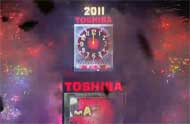
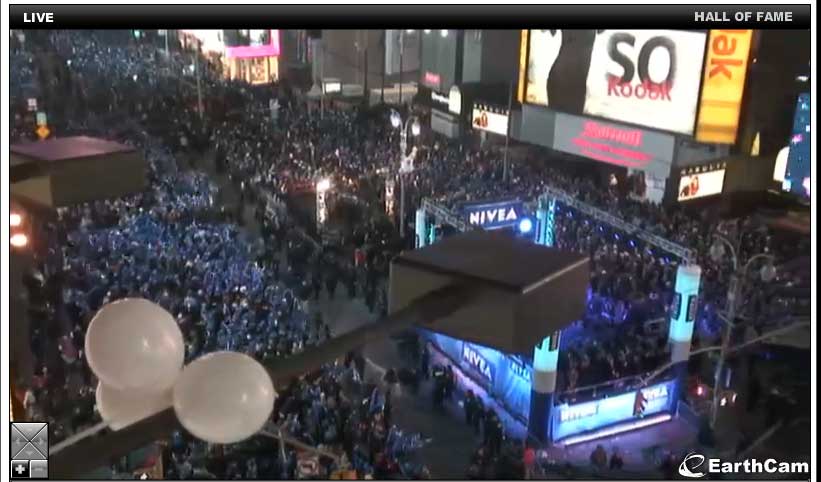
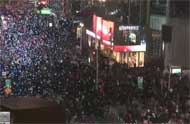
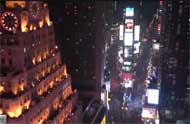
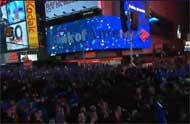
2010 Skelly Family Christmas
Fast away the old year passes, Hail the new, ye lads and lasses, Sing we joyous, all together, Heedless of the wind and weather, |
 |
 |
 |
 |
 |
| Christmas Weblog | Christmas Past | Christmas Present | Christmas Yet to Come |
| Christmas '09 |
| Christmas '08 |
| Christmas '07 |
| Christmas '06 |
| Christmas '05 |
| Christmas '04 |
| Christmas '03 |
| Christmas '02 |
| Christmas '01 |
| Christmas '00 |
| Christmas '99 |
|
New Year's without Dick Clark ...
if you can imagine that. A generation of Americans has grown up incapable of conceiving what the telephone was like before voice mail or what New Year's Eve was like without Dick Clark.
"Dick Clark's New Year's Rockin' Eve" has been helping us greet the New Year properly since 1973. The first show aired on NBC and featured Three Dog Night with other guests including Blood, Sweat & Tears, Helen Reddy and Al Green. (Actually, Clark hosted one earlier New Year's Eve Special, on December 31, 1959, on ABC with Frankie Avalon as a guest star.) In 1974 the show moved to ABC, which had been the home of "Dick Clark's American Bandstand" for so many years, and there it has remained. So Dick Clark has pretty much been ushering in the New Year non-stop now for three and a half decades. What would we do without him? What did we do without him? A hint at the answer to that can be found right in the middle of the show each year when at the stroke of midnight the familiar and bittersweet strains of "Auld Lang Syne" waft over the Times Square crowd. 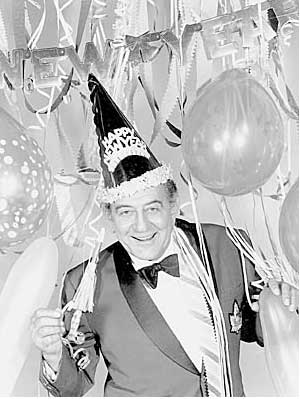 Lately the melody is quickly drowned out by Old Blue Eyes's rendition of "New York New York," a ditty Mayor Bloomberg may like but that rightfully belongs not in Times Square on New Year's Eve nor at Belmont Park in June but at Yankee Stadium, in the fall. Amazingly, after all these years, TV producers still have a tin ear. Lately the melody is quickly drowned out by Old Blue Eyes's rendition of "New York New York," a ditty Mayor Bloomberg may like but that rightfully belongs not in Times Square on New Year's Eve nor at Belmont Park in June but at Yankee Stadium, in the fall. Amazingly, after all these years, TV producers still have a tin ear.
The sixteen bars of Auld Lang Syne played in Times Square are the arrangement popularized by Guy Lombardo. Before there was a Dick Clark, Lombardo was Mr. New Year's Eve. Right up until his death in 1975, his New Year's Eve specials, on TV and before that radio were the country's overwhelming choice for ringing out the old and ringing in the new. Bandleader Lombardo and his "Royal Canadians" played dance tunes billed as "The Sweetest Music This Side of Heaven." They held court for 48 straight New Year's Eves, first at the Roosevelt Hotel Grill Room and later The Grand Ballroom of the Waldorf Astoria Hotel, entertaining well-heeled party-goers who favored tuxedos, noise-makers, party hats and dancing arm-in-arm. |
In the latter years, the crowd was undeniably aging. But when Lombardo checked out, he left a void. Late night comics like Johnny Carson used to crack, "When Guy Lombardo died, he took New Year's Eve with him."
It was a void Dick Clark was ready to fill, with a show geared to the younger, hipper America that was coming of age. In a matter of years he was a settled institution in his own right. The tall, dignified, soft-spoken Lombardo, a native of London, Ontario, was an emblem well-suited for his time, an  anodyne personality who meshed snugly with the sensitivities of the post-war generation as it morphed through the latter stages of its life. anodyne personality who meshed snugly with the sensitivities of the post-war generation as it morphed through the latter stages of its life.
And for those of you who so easily latched on to something more resonating and representative of the baby-booming "Me" Generation, there's a lesson to be taken. If you watched this year's show, you took wistful note that the eternally boyish persona of Dick Clark's Bandstand days is now but a fast-fading memory. It's been a long run. And while he's still the driving force behind the production, the serious stroke he suffered in 2004 (which kept him off the air that year) has greatly reduced his camera time and makes his on-air appearances sometimes painful to watch. Dick Clark is getting old. And just like the aging Father Time, who cedes the stage each year-end to the New Year's Baby, so are you. No one can know, certainly not the guys who plan TV shows, what the next big thing for New Year's Eve will be. But one thing is pretty certain. It's getting closer.
|
||||||